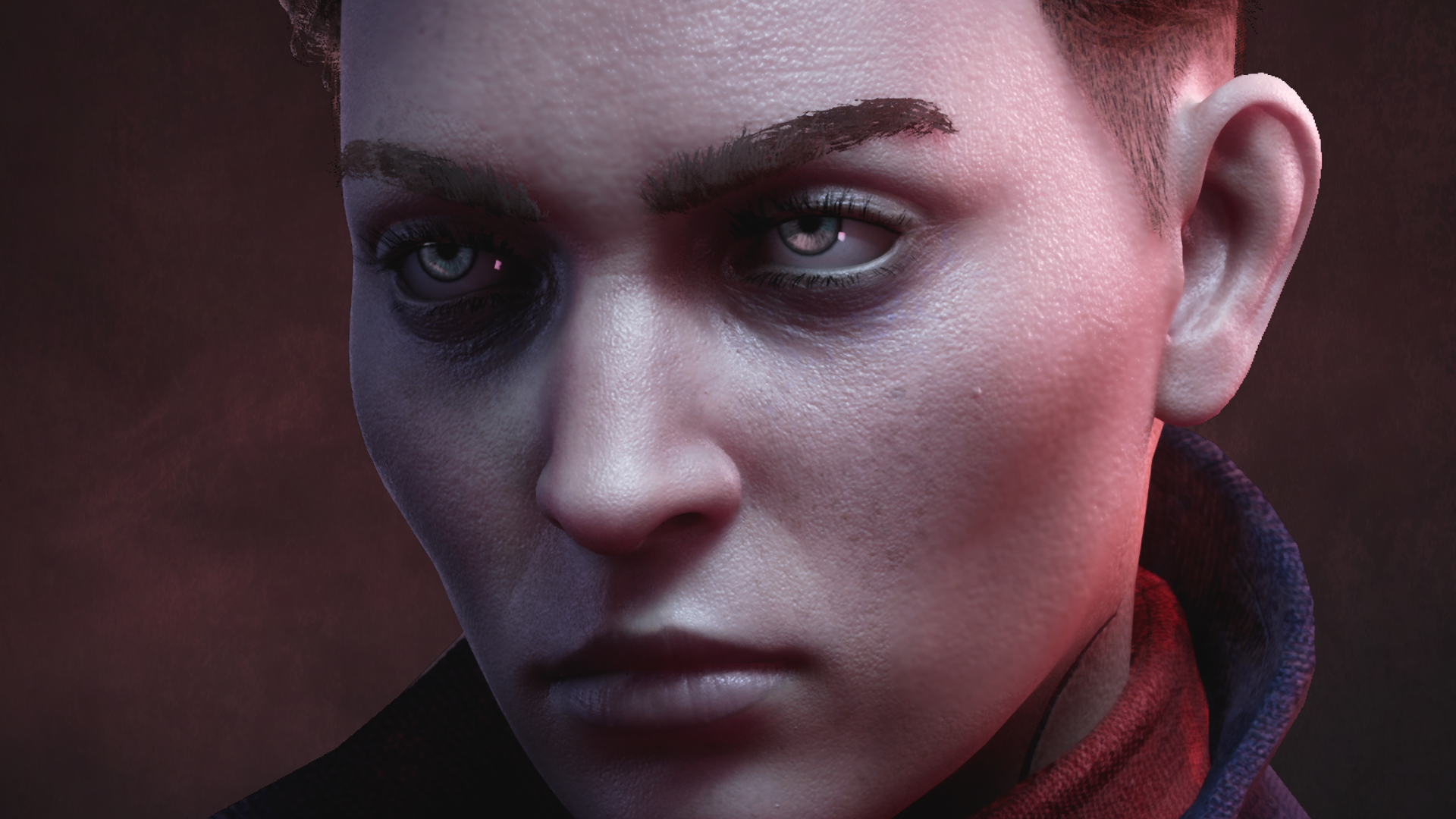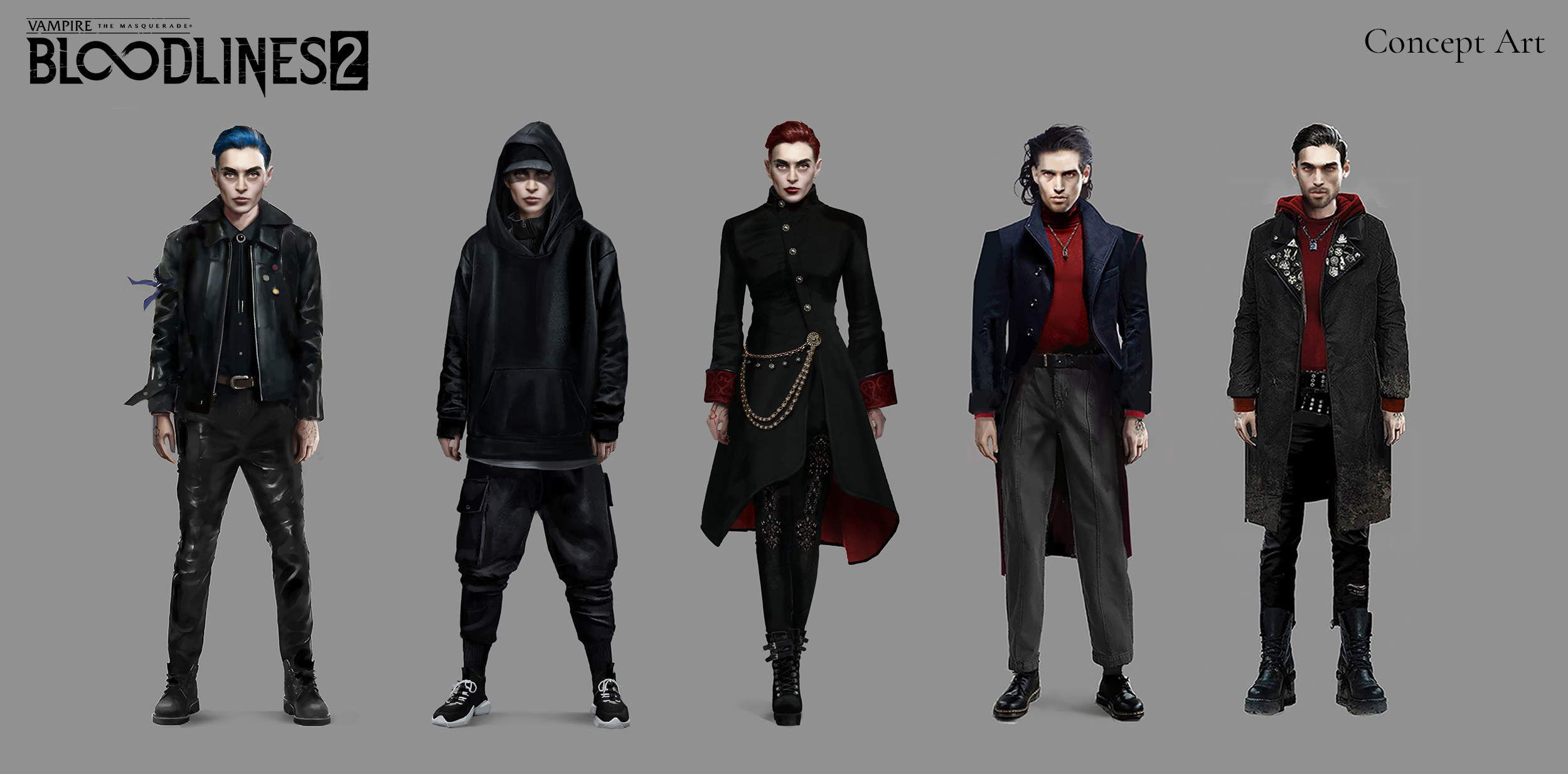Vampire: The Masquerade - Bloodlines 2 will have a voiced main character: 'it draws the player in that much more', says the game's ex-Bioware narrative quality designer
To voice or not to voice, that is the question.

Vampire: The Masquerade Bloodlines 2 (which I'll be calling 'Bloodlines 2' from here on) has had a troubled history. Its initial developer, Hardsuit Labs, fired both the game's lead writer Brian Mitsoda and creative director Ka’ai Cluney in 2020. A senior narrative designer, Cara Ellison, left later that year. Then Hardsuit Labs got booted from the project entirely in 2021.
It wasn't until September 2023 that its new developer stepped from the shadows: The Chinese Room (TCR). To describe Bloodlines 2 as 'out of their comfort' zone is an understatement. TCR has previously made narrative-heavy games like Dear Esther, Amnesia: A Machine for Pigs, Everybody's Gone to the Rapture, and Little Orpheus. An encore to a cult-classic action RPG is a bat out of left field.
I had the pleasure of speaking to TCR's Arone Le Bray, the game's narrative designer, about the project, and particularly about the game's newly announced protagonist Phyre (pronounced "Fire"). They'll be fully voiced in the vein of RPG protagonists like Mass Effect's Commander Shepard, Cyberpunk 2077's V, or the Inquisitor from Dragon Age Inquisition. That's a major departure from the first game, which leant on a more Dragon Age: Origins-meets-Bethesda style of doing things.
"Ultimately," says Bray, the choice "was down to, 'How immersive do we want the story to feel?' What having a voiced protagonist and a slightly more established character gets us is, we can go deeper into the customization, and deeper into experiencing [Phyre's] role by doing that—as opposed to trying to go more broad and encompassing all the various possibilities"
The idea of a character limited in thematic scope, with just four of Vampire: The Masquerade (VTM)'s clans to choose from (down from Bloodlines 1's initial seven), might be a bitter pill to swallow for some fans. Still, Le Bray's quick to reassure me that "there's still a lot of control there. And there's still a lot of personal personalization and player choice. But it's not in such a way that it stops the story."
Le Bray's no greenhorn when it comes to storytelling in RPGs. He's worked on games with both silent and voiced protagonists during his 15-year tenure at Bioware. "A lot of what I did at Bioware was listen to the inflections of some of the incredibly talented voice actors we had," he tells me. "And yeah—they bring so much of that into their performances and into the game. It draws the players in that much more, at least in my opinion."
That's a tough sell for me personally, as I like a good silent protagonist—and if Baldur's Gate 3's major success is any indication, I'm not alone. I do, however, see Le Bray's perspective here. To say I've never enjoyed a line read from Commander Shepard or V would be a lie. In fact, the V from my Cyberpunk playthrough has completely endeared himself to me. Le Bray argues that adding an actor's performance to a game brings a whole new dimension to the moment to moment dialogue.
Keep up to date with the most important stories and the best deals, as picked by the PC Gamer team.
"I don't need to use an entire paragraph to say 'this character is sad' … you can get that across with the tone of voice—like maybe the line they're saying has that sadness built in, or that emotional quality built in, and that subtext is there," Le Bray says, bringing up the CRPGs of old. "There were a lot of games where you had to have giant walls of text [but] the little smirk or a raised eyebrow gets just as much across. There's a lot more immersion we can give by having a [voiced protagonist]."
That doesn't address my Clan worries, though. Two clans from the first game in particular—the Malkavians and the Nosferatu—completely changed your experience. The Malkavians enjoyed an entirely different set of dialogue options, wrapped up in their Clan's madness, while the Nosferatu were so disfigured even showing their faces would violate vampiric law known as The Masquerade.
Obviously, with a voiced character, there's less room to play in that space. Le Bray reassures me however that your Phyre's starting clan will still impact the story, though he's light on the specifics. "I can say, as far as playing through as Phyre goes, there are certain things that might be available to a clan … when you are interacting with a character, maybe you can [appeal or interact] with that character in a different way, depending on clan choices."

To my ear, that sounds like more of a 'V' situation. For context, in Cyberpunk 2077, V can have one of three origins—Corpo, Nomad, or Street Kid. I went Street Kid myself, and while it didn't always come up, I was still impressed by how much V embodied a street kid when I did go in for those options. While I'm not sure Bloodlines 2 will have a Malkavian equivalent (especially as the Clans are yet to be revealed), I'm excited to see how they handle it.
I also brought up what Le Bray calls the "dreaded paraphrase mismatch". For the example I used, I invoked Mass Effect 1's reporter scene, where the dialogue choice "Time to shut you up!" leads to Shepard saying "I've had enough of your snide insinuations", before decking a journalist in the face.
"Yup!" Le Bray says, laughing: "I know exactly that moment."
"Anytime we ask the player to make a choice, we want the player to get the outcome that they feel they've earned … If I press the B button to jump, and my character doesn't jump, that's a problem—it's the same kind of thing with the dialogue choice. If I want the character to yell at this other character, and I choose [that option], and it goes 'please can you just be nice to me?' it's like ugh, I didn't want that to happen."
To avoid those situations, Le Bray talks about internal play tests, where "we can send that dialogue around to other people and be like, 'hey, does this make sense to you?'" However, he also says they're experimenting with subverting expectations. "Sometimes we get to play with that, 'cause if they expect one thing, what if we do exactly the opposite, or some variation of it?"
That might seem annoying at face value, but there's a moment in Star Wars: The Old Republic, during the Imperial Agent storyline, where that particular knife is twisted to awesome results. I'm not going to spoil the moment but if you've played it, you know. Le Bray responds "I know exactly the one you're talking about."
Phyre is a major departure from the first game, being a vampire who's been kicking since the 17th century. In contrast, the player character in Bloodlines 1 is newly-minted. Le Bray says the studio is playing on that departure: "The great thing about Phyre too and the way they react with all these other characters is [they're an] unreliable narrator of history … what they choose to share and what might be legend … there's a lot of playing around we get to do there, and I love it."
Ultimately, Le Bray is just "excited we're telling people about this," and I can't say I blame him. Bloodlines 2 has been under wraps for so long, shrouded in a Masquerade of its own, subject to the changing of hands and development hell. "[The game is] something we really wanted to work on behind the scenes, and get into a really good solid position so that we could share it … Everybody at the studio wants to see how people react."
I'm only cautiously optimistic right now, even if Le Bray's enthusiasm is infectious. I already knew narrative and story are things that TCR is good at, but the moment to moment gameplay, the RPG elements—those are the coin flips the studio is risking by taking on a project that, up until now, has had a curse of its own. I like an underdog, though, and I'm personally hoping they pull it off.

Harvey's history with games started when he first begged his parents for a World of Warcraft subscription aged 12, though he's since been cursed with Final Fantasy 14-brain and a huge crush on G'raha Tia. He made his start as a freelancer, writing for websites like Techradar, The Escapist, Dicebreaker, The Gamer, Into the Spine—and of course, PC Gamer. He'll sink his teeth into anything that looks interesting, though he has a soft spot for RPGs, soulslikes, roguelikes, deckbuilders, MMOs, and weird indie titles. He also plays a shelf load of TTRPGs in his offline time. Don't ask him what his favourite system is, he has too many.

